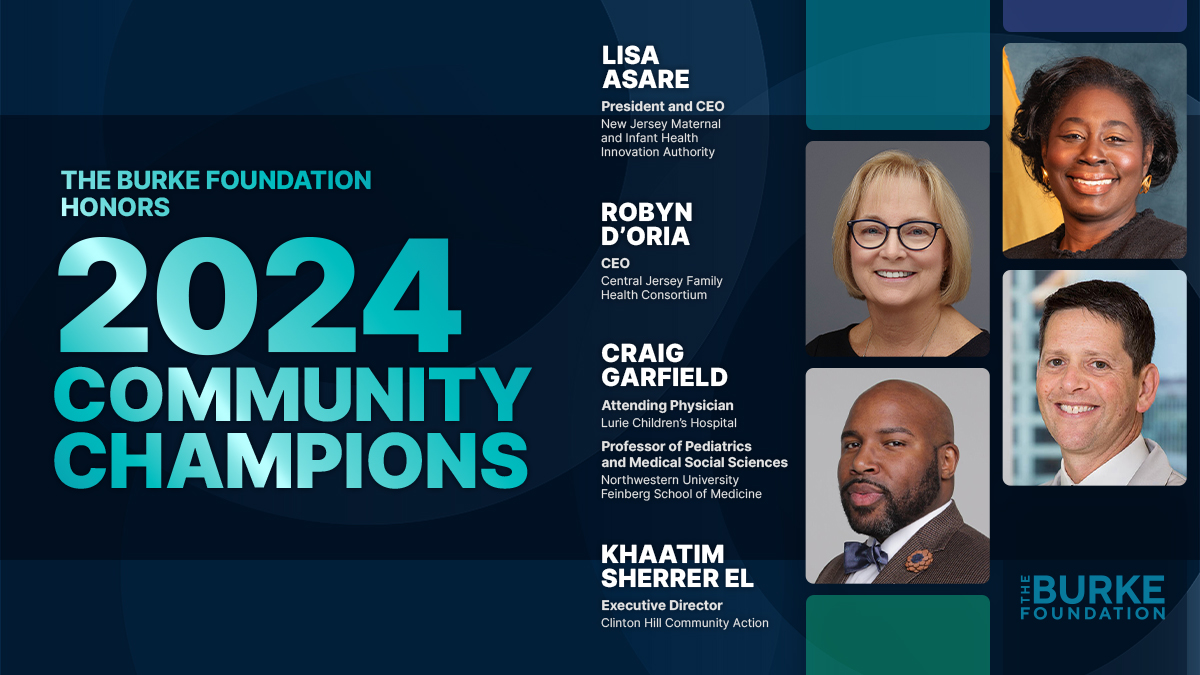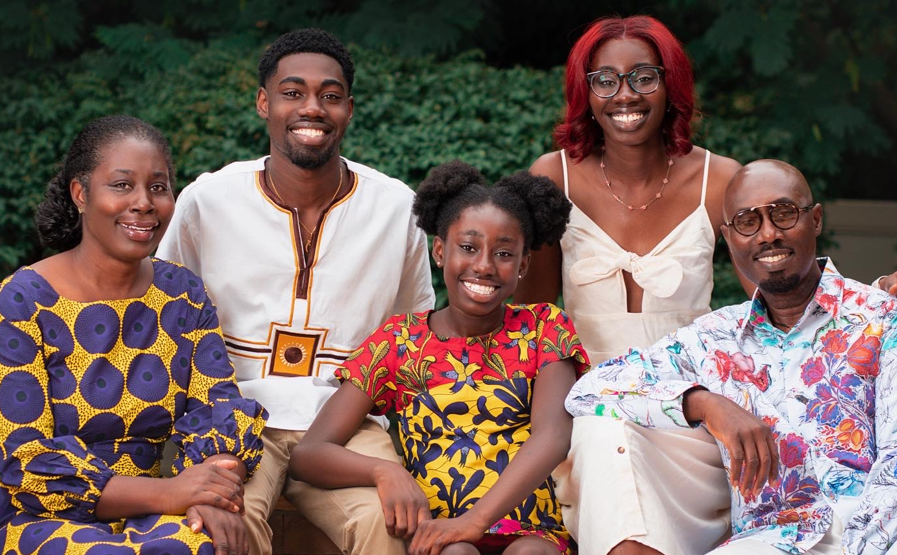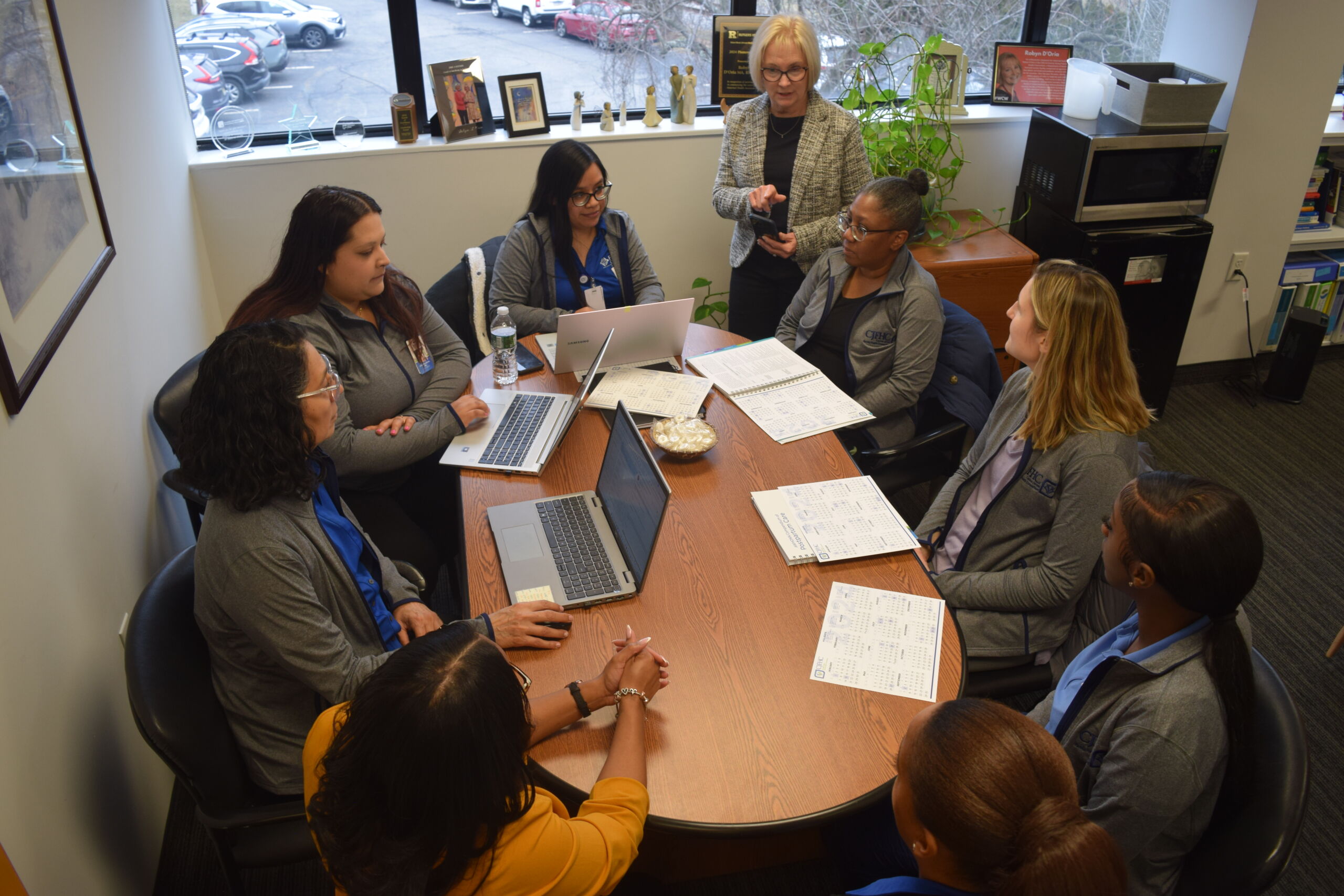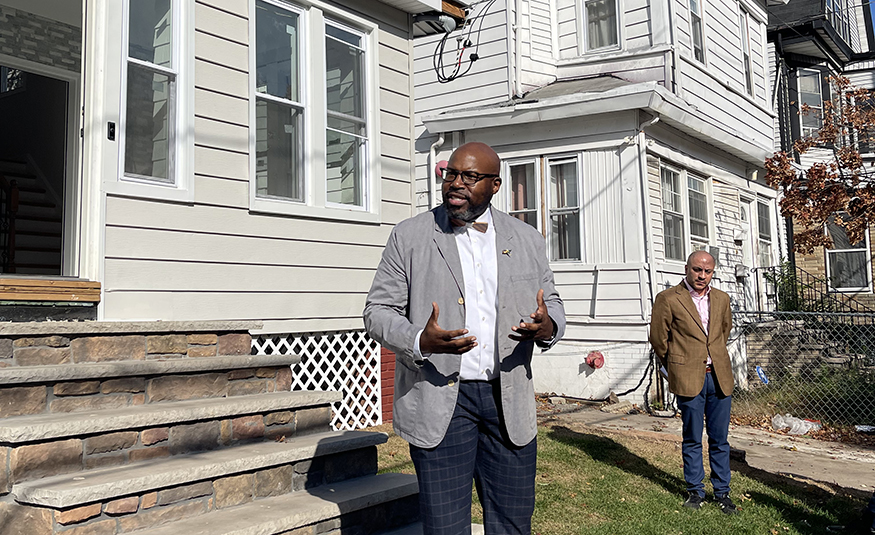👋 Happy Holidays!
“When a child walks in the room, your child or anybody else’s child, do your eyes light up? That’s what they’re looking for.” – Toni Morrison
That powerful reminder speaks to the heart of the Burke Foundation’s mission to help make sure every child feels seen, valued, and loved. Parent-child bonding begins with these moments of connection — moments that lay the foundation for a child’s emotional well-being and long-term success.
At Burke, we work to support families by alleviating stress and helping them to have the healthcare and community resources they need to thrive. Through trusted community care, we empower families to create the space and stability that enable them to light up when their children walk in the room.
As is our tradition, this final Starting Early issue of the year honors the Burke Foundation Community Champions, whose transformative work benefits families during the earliest years. This year, we’re thrilled to celebrate 4 exceptional leaders on the front lines of delivering services and reimagining entire systems to support young children and their families.
These 2024 Community Champions understand the financial, emotional, and logistical challenges families face and work hard to find and implement solutions. Their work lowers barriers and helps new parents chart a course for their children’s lifelong health and well-being, creating a ripple effect that strengthens entire communities.
The 2024 Burke Foundation Community Champions are:
⭐Lisa Asare, president and CEO, New Jersey Maternal and Infant Health Innovation Authority
⭐Robyn D’Oria, CEO, Central Jersey Family Health Consortium
⭐Dr. Craig Garfield, attending physician, Lurie Children’s Hospital, professor of pediatrics and medical social sciences at Northwestern University Feinberg School of Medicine
⭐Khaatim Sherrer El, executive director, Clinton Hill Community Action
Read more about Burke Champions’ accomplishments below and click the link to each of their interviews to see why they inspire us.
As we end the year, the Burke Foundation staff, trustees, and I wish you the happiest and healthiest holiday season and all the best for 2025. 🥳
Atiya Weiss
Executive Director, the Burke Foundation

The Burke Foundation invests in changemakers who support, advocate, and solve problems on behalf of those who face difficult hurdles as they navigate family life in the earliest years.
Learn more about our Champions below, and be sure to read their full interviews, where they share their passion, solutions, and advice on effective partnerships.
1. Using innovation for the health of families

Lisa Asare, president and CEO, New Jersey Maternal and Infant Health Innovation Authority
Instrumental in the launch of Nurture NJ — New Jersey First Lady Tammy Murphy’s effort to make New Jersey the best place to have and raise a child — Lisa Asare now heads one of the most exciting pillars of the initiative: the New Jersey Maternal and Infant Health Innovation Authority. Along with bringing quality, community-centered care to Trenton residents, this new state agency looks for ways to use technology and other innovations to ease the burdens on parents and reduce health disparities among families.
Lisa sees the postpartum period as one of the most challenging for families. “We do so much in the prenatal period — we have fancy baby showers and reveal parties. But the truth of the matter is the real work starts the minute you get home with the baby,” she says. And that is the time when a lot of people are isolated.
As a parent of 3, including 2 daughters, Lisa feels responsible for improving conditions for Black women, recognizing they are 7 times more likely to die from a pregnancy-related complication than white women. “The setting we are creating today,” she says, “is the setting my own daughters will come up in. I’m not just doing this for them. I’m doing it for all of our daughters.”
We selected Lisa as a Community Champion for her more than 20 years in public service tackling complex policy and programmatic challenges often exacerbated by deep-rooted systemic biases. At the New Jersey Departments of Health and Human Services, Lisa approached her work with thoughtfulness, humility, creativity, and a willingness to partner beyond the halls of government. And she has always centered the community voice, knowing that those closest to the issues must inform and guide the solutions.
Click here to read our interview with Lisa, including how she thinks AI can make a difference for New Jersey families, especially if applied across the lifespan to help families navigate the many challenges they encounter.
2. Caring for families in the earliest days through nursing

Robyn D’Oria, CEO, Central Jersey Family Health Consortium
Robyn D’Oria was instrumental in launching New Jersey’s inaugural pilot of Family Connects in Mercer County — a program since expanded into the groundbreaking Family Connects NJ initiative that provides a home nurse visit soon after birth and helps families obtain services, from lactation support to food resources.
Reflecting on her time as a labor and delivery nurse, Robyn says, “We thought we were taking care of all the needs a family might have prior to discharge. But I learned very quickly that we had no idea of the challenges and vulnerabilities families in New Jersey had outside the hospital.”
She adds, “Family Connects helps bridge the gap between prenatal care, labor and delivery, and early postpartum at home when they’re establishing the family unit. This is when we help ensure they have the healthiest start in life by making referrals, connecting them to additional clinical care, and circumventing any complications that might arise in those first few weeks after delivery.”
Family Connects NJ works with households from all walks of life. And the dire needs of some families still shock Robyn. Home visit nurses frequently encounter families lacking such basic necessities as diapers and food. We want moms to breastfeed, but if the mom’s not eating, the breast milk won’t be there either, she explains.
The ability of Family Connects NJ nurses to link families to resources is a major reason the program’s success is a career highlight.
We selected Robyn as a Community Champion for her passion for and dedication to supporting moms and babies. She carefully nurtured a skilled team of nurse home visitors, collaborated with the Trenton Health Team to raise community awareness of the pilot program, and used her leadership platform to share valuable lessons learned. Her work inspires others and advances the impact of community-centered nursing.
Click here to read Robyn’s views on how attending to families in the earliest weeks after birth can make a lifelong impact on health and well-being.
3. Understanding the ins and outs of fatherhood

Craig Garfield, attending physician, Lurie Children’s Hospital; professor of pediatrics and medical social sciences, Northwestern University Feinberg School of Medicine
A practicing physician for 20-plus years and former stay-at-home-dad, Craig Garfield wears many hats. Among them is leading the effort to expand to fathers and non-birth partners the Pregnancy Risk Assessment Monitoring program initiated for mothers to reduce infant morbidity and mortality by influencing behaviors before, during, and after pregnancy. PRAMS for Dads is the first effort by the CDC to understand the experience of fathers and other birth partners in the first year after birth. The state Department of Health is now launching that program in New Jersey.
Craig believes one of the most hopeful times in anyone’s life, including fathers, is the arrival of a new baby. But fathers often are shunted aside. “I am amazed what short shrift we give to men and fathers in general when we think about our programs,” he says, “even what we call things — like maternal and child health, which clearly leaves out the father and the non-birth partner.
Craig says, “As one dad explained, ‘When I walk into the OB/GYN office, it’s like I’m walking into the women’s bathroom. I know I don’t belong here. Get me out of here.’”
PRAMS for Dads developed data showing that fathers who are involved and supportive of breastfeeding are more likely to have partners who breastfeed for longer. Craig adds, “So there’s a lot of great benefits for families if you focus on the very beginning of those 1,000 days.”
That benefit for fathers is why Craig is so excited about the PRAM for Dads research. “It was the first time we had any public health awareness or monitoring of fathers in that transition period,” he explains.
We selected Craig as a Community Champion for his deep commitment to elevating the presence and role of fathers — who too often are overlooked to the detriment of their own well-being and that of their families. From advocating to expand the Pregnancy Risk Assessment and Monitoring System to include fathers to developing an app that supports dads in the NICU, Craig helps make sure a vital member of the family unit is both visible and empowered to engage meaningfully.
Click here to learn about Craig’s perspectives on connections fathers can form when supported by Paid Family Leave and related initiatives.
4. Building and serving a community

Khaatim Sherrer El, executive director, Clinton Hill Community Action
As leader of Clinton Hill Community Action, Khaatim Sherrer El oversees efforts to revitalize this distressed Newark Neighborhood in deep partnership with residents. With quality child care a high priority, the group serves 198 families in a state-of-the-art facility. Among other areas of focus are housing, the arts, and addressing the lack of healthy food — including a resident-run grocery store that works in place of a traditional food pantry.
Embracing a philosophy that a community thrives only with the input and commitment of the people who live there, Clinton Hill Community Action brings in residents to address the neighborhood’s many challenges.
The first step is to build trust. “A lot of groups do amazing work, but our trust-building process allows residents to do something as simple as believe again, and not just believe that change is possible, but that change is for them,” Khaatim says.
Clinton Hill Community Action — and the city of Newark and the state — offer assistance in many forms, but too many residents aren’t aware of it. One solution Khaatim developed is to assign families a mentor to help navigate the system, asking in return only that families spread the word about what’s available.
We selected Khaatim as a Community Champion for his commitment to addressing root causes of inequity during his decades of service in the nonprofit and public education sectors. His work creates pathways to opportunity, strengthens community connections, and empowers families to thrive.
Click here to learn how Khaatim built an organization where 95% of staff live in the neighborhood, re-investing millions back into the community.
